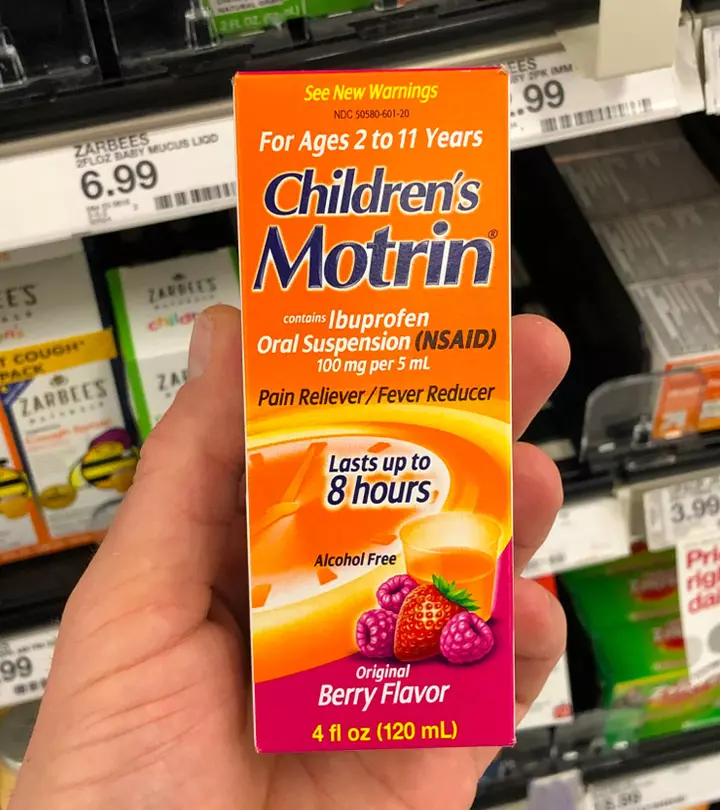
Image: ShutterStock
Stomach flu during pregnancy, or viral gastroenteritis, is an infection by a virus that causes acute inflammation in the intestinal lining. Pregnant women are more prone to dealing with stomach flu and its complications because of their weakened immune systems (1). In most cases, this infection is self-limiting and does not harm the baby. Many home remedies may also help you deal with the issue. However, you should seek medical advice if you notice worrying symptoms such as high fever, fatigue, or diarrhea, that may impact maternal health and fetal development.Read this post to learn about the causes of stomach flu during pregnancy, its symptoms, treatment, and prevention.

Key Pointers
- Stomach infections are prevalent during pregnancy due to the weakened immune system.
- These infections are commonly caused by viruses.
- Common symptoms of stomach flu include fatigue, dehydration, and chills.
- Proper rest, staying hydrated, and consuming healthy food can help manage the symptoms.
Causes Of Stomach Flu During Pregnancy
Stomach flu or viral gastroenteritis can be caused by viruses such as norovirus, rotavirus, adenovirus, sapovirus, and astrovirus. Among these, noroviruses, also known as stomach bugs, cause approximately 50% of foodborne viral infection outbreaks worldwide (2). The illness is contracted from contaminated water or food that is made under unhygienic conditions or not cooked properly.
You may also get viruses through direct contact with infected people or if you keep unwashed hands in your mouth after touching contaminated surfaces (2) (3).
Note: Acute gastroenteritis can also be caused by bacteria like salmonella, listeria, shigella, and campylobacter jejuni (2).
According to the US Centers for Disease Control and Prevention (CDC), listeriosis affects around 1,600 people annually in the US. It is the third leading cause of death from foodborne illnesses, with approximately 25% of fetal deaths occurring during pregnancy (4).
Though the symptoms are somewhat similar to stomach flu, it may require treatment with medication such as antibiotics. Stomach flu is not the flu, which is a respiratory illness caused by the influenza virus (3).
 Did you know?
Did you know?Stomach Flu or Morning Sickness?
Stomach flu can be harder to identify during the early stages of pregnancy when most women suffer from morning sickness. However, if vomiting and nausea are accompanied by food avoidance, cramps, fever, or diarrhea during pregnancy, you may be suffering from stomach flu. Moreover, stomach flu will last only for a few days, while morning sickness remains until the second trimester (5).
Gynecologist and obstetrician Dr. Hrishikesh Pai opines, “Symptoms in early pregnancy, such as nausea and vomiting, are often similar to those of stomach flu. These are typical in the first trimester and are usually due to hormonal shifts. However, these (morning sickness) symptoms are usually not as severe as the stomach flu and do not include a high fever, a common sign of an infection like gastroenteritis.”
Symptoms Of A Stomach Flu

In order to make sure that it is not morning sickness but stomach flu, you should look for a few more signs that show up in the first two days.
The Possible Symptoms To Watch For Include (6):
- Severe diarrhea or loose, watery stools
- Abdominal pain and cramps
- Sudden low-grade fever
- Muscle aches
- Chills
- Fatigue
- Headache
- Dehydration
These symptoms may seem mild initially, but if they do not subside even after two days, you should check with a healthcare provider. It helps to treat the condition effectively. Dehydration can be very serious during pregnancy, whether caused by morning sickness or infection. No matter the cause, it’s important to see a doctor if your symptoms are severe.
How To Deal With Stomach Bug During Pregnancy?
If you are just beginning to feel the early symptoms, you can help yourself with a little care and effort. Here are some ways you can take care of yourself at home:
1. Drink enough fluids
Fluids are very important when you are suffering from stomach flu. Your body loses fluids through sweating, vomiting, and diarrhea. You are at risk of dehydration, especially if you are suffering from frequent urination or passing dark-colored urine. The lack of fluids may cause a reduction in the volume of blood, which may then compromise oxygen and nutrition supply to the growing fetus (7).
Symptoms like constant thirst, dry mouth and skin, dark-colored urine, urine inconsistency, lack of urine, fatigue, or dizziness indicate dehydration (8).
What to drink:
Drink plenty of water, clear broth, warm water with lemon (relieves gas), decaffeinated tea or diluted juice (white grape juice is easy on the tummy). Grape water, vegetable broth, soups, ginger ale, curd, yogurt, skimmed milk , and coconut water are good options. You can also try popsicles or ice chips.
Megan McGrory Massaro, a mom and a blogger, endured a bout of stomach flu during pregnancy. Recalling her experience, she says, “I didn’t drink anything for an hour or two after the vomiting stopped. By then, I was pretty parched, and I knew water was not a good solution (despite common practice). If you’ve had several bouts of vomiting, you’ll have lost a good supply of electrolytes, so a rehydration drink is best.
“You can add some sugar or honey and sea salt to regular water to make a simple drink, but that doesn’t sound appealing. I have lots of coconut water around the house, and it’s been amazing. At first, I drank it straight, then I added a little sea salt, honey, and fresh lemon. It tastes delicious and has replenished me (i).”
You can add a dash of ginger to your juices or snacks, as it may help in combating infection. It also decreases nausea. After talking to your doctor, you can also drink over the counter oral rehydration solutions, such as Pedialyte, DripDrop, etc., to cope with fluid and electrolyte loss (7) (9).
What not to drink: Caffeinated drinks such as strong black tea, coffee, and chocolate should be avoided. Stay away from alcohol as it is a diuretic and can aggravate your stomach flu. Stay away from outside food and junk food. You should also avoid undiluted fruit juices and sugary drinks that may increase diarrhea (7) (10). Drinks and food that contain a lot of fat should also be avoided since they increase diarrhea.
2. Rest
Sickness and diarrhea due to stomach flu can make you feel tired and weak as your body fights against infection and also works to nurture your baby. Therefore, it is very important to get as much rest and hydration as possible. Rest until you feel you have recovered completely (11).
3. Eat proper food
As the symptoms of stomach flu begin to clear, you can gradually introduce bland and semi-solid foods. They are easier to digest. Solid foods are difficult for you to digest. Do not force yourself to eat more, as it can cause nausea.
The BRAT diet (7): It is the best diet option to ease the stomach issue. It consists of bananas, rice, applesauce, and toast, which contain a considerable amount of carbohydrates. They provide energy and replenish your body with the nutrients lost through diarrhea and vomiting.
Bananas: Ripe ones support digestion and replace the lost potassium.
Rice: White rice is easy to digest and gives energy. Do not take brown rice as it contains high fiber, which could be hard on the stomach.
Applesauce: Offers an energy boost through carbs and sugars present in it. It also contains pectin, which eases diarrhea.
Toast: White bread is a good option and easy to digest. Whole wheat bread contains excess fiber, which is again not good for the digestive system.
Boiled salty potatoes are also recommended during diarrhea, since it is a good source of carbohydrates and the salt is good to replace the lost electrolytes.
What not to eat: Dairy, fibrous, spicy, or fatty foods should be avoided.
Dairy: Everyone may not have a problem with milk or dairy products, but they are not easily digestible.
Fiber: Too much fiber can cause flatulence, bloating, loose stools, and diarrhea.
Fatty foods: Do not include oily foods. Also, cut down spicy curries, chili sauces, and tomato containing dishes.
 Point to consider
Point to consider4. Ginger
Ginger is a natural digestion aid and an effective remedy for nausea (12). It may help relieve the symptoms of vomiting and nausea during pregnancy. You can take ginger chews available at health food stores or prefer homemade ginger tea. Here is how you can make brewed ginger tea:
You will need:
- Freshly grated ginger – 1 1/2 teaspoon
- Boiling water – 1 1/2 cup
How to make:
- Take a cup and put the grated ginger.
- Now fill it with one-and-a-half cups of boiling water.
- Let it remain for about ten minutes and then strain it.
If it tastes strong, you can add more boiling water to dilute the tea. Do not add any sweetener or sugar.
Massaro also tried some other remedies. She notes, “I also had pretty bad nausea on and off for the 12 hours after I got sick, so ginger was a must-have to keep that at bay. Once I moved into the diarrhea phase, I switched to an elder flower and red raspberry leaf tea, which help regulate digestion and improve diarrhea.”
5. Mint
According to The Oxford Book of Health Foods, written by J.G Vaughn, a professor of food sciences at London’s King’s College, and Dr. P.A. Judd, Principal Lecturer at the University of Central Lancashire, peppermint could also help combat an upset stomach, and it may ease symptoms of acute gastroenteritis. You can prepare peppermint tea the same way as ginger tea. You can also add lemon juice to add more flavor.
6. Probiotics
Consuming probiotics may help in the management of acute gastroenteritis. You may continue to take them during the illness and also for at least two weeks later (13).
7. Electrolyte drinks
Ideally, your body system maintains a balance and contains ionic solutions known as electrolytes. They regulate the functioning of your body, nerves, and muscles. When you are suffering from stomach flu, you lose many of these ionic solutions through diarrhea and vomiting.
To regain energy, stamina, and strength, you should replenish your body with the lost electrolytes. You can drink diluted, non-sugary natural fruit juices to prevent dehydration. You can drink diluted, non-sugary fruit juices to prevent dehydration. You can take over the counter (OTC) oral rehydration solutions as recommended by your doctor to manage electrolyte loss (7).
Here is one homemade drink recipe that could help restore your energy.
You will need:
- Fresh orange juice – ½ cup
- Fresh lemon juice
- Filtered water – 2 cups
- Raw honey – 2 – 4 tbsp, for taste
- Unrefined salt – 1/8 tsp, for taste
How to make:
Mix all the above ingredients and blend them until smooth.
Water Vs. Electrolyte Replacement Drinks: Which One Is Better?

This depends on how severe your symptoms are. The more severe your symptoms are, the higher is the loss of electrolytes. Water and other clear fluids will help you to prevent dehydration, not replace the lost electrolytes. You should drink oral rehydration solutions, as per your doctor’s advice, to replace the electrolyte loss (7). However, it is recommended that you seek medical attention if you are experiencing stomach bugs or any other infections during pregnancy.
When Should You Call The Doctor?
Stomach flu usually subsides in a few days. But it is recommended to call and seek your doctor’s advice if you contract the stomach flu while pregnant. You may require immediate medical attention, if you have (14) (15):
- High fever
- Severe abdominal cramps and diarrhea
- ‘Coffee grounds’ appearance or blood in vomit or stool
- Signs and symptoms of dehydration such as dry mouth, dark urine, etc.
- Appetite loss and extreme fatigue
- You are not able to keep food down for a considerable time
- You cannot keep liquids down
- Frequent diarrhea and vomiting exceeding three days
Can You Take Medication?

If you contract a stomach bug while pregnant and your symptoms are mild, your doctor may recommend home treatments with adequate fluid and electrolytes. Some women may require hospitalization and intravenous infusion of fluids and electrolytes if there is severe dehydration.
Some natural remedies that could treat morning sickness during pregnancy can also help with nausea and vomiting related to stomach bugs or other viruses. You may require antibiotics if acute gastroenteritis is caused by bacteria such as salmonella and listeria.
You may also be prescribed oral probiotic preparations that can be dissolved in water.
Note: Pregnant women are restricted from taking some medication that could harm the baby. It is recommended to seek your doctor’s advice before taking over-the-counter including antacids (Rolaids, Tums, Maalox), gas relievers (Mylicon), and Acetaminophen or Tylenol medication for symptom relief (16).
How To Prevent Stomach Flu While You Are Pregnant?
The following tips will help you prevent stomach bug during pregnancy (9) (17) :
- Wash your hands properly after using the washroom or toilet. Make sure the toilet seat and the area are cleaned every day. Consider cleaning the flush, taps, basin, door handles, and other surfaces with detergent and hot water.
- Avoid drinking impure water or eating uncooked foods.
- Wash your hands after gardening or touching your pets.
- You should not cook any food when you are ill. But if there is no option, wash your hands thoroughly before cooking.
- You should keep a separate towel and flannel for cleaning and drying your hands.
- Keep away from those suffering from stomach flu. It is just a precaution but not something to be overly concerned about.
- Do not consume food that may have been infected staying outside the refrigerator for more than a couple of hours.
- Have a healthy diet, consume plenty of water, and do frequent and moderate exercises.
Can Stomach Infections Hurt Your Baby?

A stomach bug is not a virus that would spread directly to your baby. As long as you are healthy, your body will possess many natural defenses that help protect your baby from harm.
Pregnant women may have complications from viral gastroenteritis due to severe dehydration and high fever. Dehydration during pregnancy causes changes in the amniotic fluid volume and composition (18).
A Swedish study shows that gastroenteritis during pregnancy had an impact on the duration of pregnancy, but not on neonatal outcomes. However, it is important to seek medical care if you have stomach flu during pregnancy to avoid complications and to identify other causes that may have stomach flu-like symptoms and could warrant emergency medical care.
Frequently Asked Questions
1. Can the stomach flu cause complications during my pregnancy?
Untreated stomach flu can cause symptoms such as fatigue, fever, diarrhea, nausea and vomiting or Hyperemesis Gravidarum, and dehydration in pregnant women. These may increase the risk of several complications, including severe ones such as preterm labor (19).
2. How can I help my partner if they also experience stomach flu?
Sanitization, maintaining a healthy diet, taking doctor-prescribed medications, and avoiding physical contact can help you and your partner manage stomach flu better (19).
3. Can stomach flu during pregnancy lead to preterm labor or other complications?
If the stomach flu is severe or is left untreated, it may cause serious illnesses and even preterm labor. Therefore, if the symptoms do not subside within a week, it is recommended to consult your doctor for prompt treatment (19).
4. What home remedies are safe for pregnant women experiencing stomach flu?
Pregnant women experiencing stomach flu can manage symptoms safely with home remedies. Prioritize staying hydrated with water, electrolyte drinks, or ginger tea to ease nausea. Rest is essential for recovery, so stay home and near a bathroom if needed. If tolerable, eat bland, carb-rich foods like rice, bread, or pasta to sustain energy. Once symptoms subside, restore gut health with probiotic-rich foods like yogurt. Avoid dehydration and consult your healthcare provider if symptoms worsen or persist to ensure both your and your baby’s safety.
Stomach flu during pregnancy could cause dehydration and may hinder food intake. Hence, if you show signs of stomach infection, report to your healthcare provider for prompt treatment since stomach flu spreads through contaminated food and water or an infected person. If you are confused between morning sickness and stomach flu, it is safe to report the symptoms to a medical professional for diagnosis. Rest well on diagnoses, eat a bland diet, and stay hydrated. If you notice any severe signs of an infection, consult your doctor.
Infographic: How To Deal With Stomach Bug During Pregnancy?
Stomach bugs can be caused by various factors, including viruses, bacteria, and food poisoning. So, it is important to take care of your health and seek medical attention if necessary. The infographic below suggests steps to help alleviate the symptoms of a stomach bug and manage your recovery.
Some thing wrong with infographic shortcode. please verify shortcode syntax
Personal Experience: Source
MomJunction articles include first-hand experiences to provide you with better insights through real-life narratives. Here are the sources of personal accounts referenced in this article.
i. Surviving the Stomach Bug During Pregnancy;https://theotherbabybook.wordpress.com/2014/02/01/surviving-the-stomach-bug-during-pregnancy/
References
- umita Mehta, et al.; Gastroenteritis In Pregnancy: Relevance and Remedy
- Nathan D. Stuempfig and Justin Seroy.; Viral Gastroenteritis
- Norovirus; The Centers for Disease Control and Prevention
- About Listeria Infection; The Centers for Disease Control and Prevention
- Morning Sickness: Nausea and Vomiting of Pregnancy; The American College of Obstetricians and Gynecologists
- Symptoms & Causes of Viral Gastroenteritis (��Stomach Flu”); The National Institute of Diabetes and Digestive and Kidney Diseases
- Gastroenteritis: (��Stomach Flu”); Cornell Health; Cornell University
- Dehydration; The United States National Library of Medicine
- Treatment of Viral Gastroenteritis (��Stomach Flu”); The National Institute of Diabetes and Digestive and Kidney Diseases
- Eating, Diet, & Nutrition for Viral Gastroenteritis (��Stomach Flu”); The National Institute of Diabetes and Digestive and Kidney Diseases
- Viral gastroenteritis fact sheet; Health; New South Wales; Southeastern Australia
- Mehrnaz Nikkhah Bodagh, et al.; Ginger in gastrointestinal disorders: A systematic review of clinical trials
- Szajewska H, et al.; Use of probiotics for management of acute gastroenteritis: a position paper by the ESPGHAN Working Group for Probiotics and Prebiotics.
- Should pregnant moms be concerned about gastroenteritis?; The University of Texas Southwestern Medical Center
- Nausea & Vomiting: When to Call the Doctor; The Cleveland Clinic
- Medications Safe for Use During Pregnancy; Von Voigtlander Women’s Hospital; Michigan Medicine
- How to Prevent Norovirus; Centers for Disease Control and Prevention
- Schreyer P, et al.; Maternal dehydration: impact on ovine amniotic fluid volume and composition.
- Should pregnant moms be concerned about gastroenteritis?; UT Southwestern Medical Center
- Norovirus; The Centers for Disease Control and Prevention
- BRAT Diet: Recovering From an Upset Stomach; American Academy of Family Physicians.
Community Experiences
Join the conversation and become a part of our nurturing community! Share your stories, experiences, and insights to connect with fellow parents.
Read full bio of Dr. Burcu Saygan Karamürsel
- Dr. Hrishikesh Pai is an IVF specialist, gynecologist, and obstetrician. He is the founder and managing director of Bloom IVF. Dr. Pai is the president and former secretary-general of the Federation of Obstetric and Gynaecological Societies of India (FOGSI).
 Dr. Hrishikesh Pai is an IVF specialist, gynecologist, and obstetrician. He is the founder and managing director of Bloom IVF. Dr. Pai is the president and former secretary-general of the Federation of Obstetric and Gynaecological Societies of India (FOGSI).
Dr. Hrishikesh Pai is an IVF specialist, gynecologist, and obstetrician. He is the founder and managing director of Bloom IVF. Dr. Pai is the president and former secretary-general of the Federation of Obstetric and Gynaecological Societies of India (FOGSI).
Read full bio of Rebecca Malachi
Read full bio of Swati Patwal
Read full bio of Aneesha Amonz

















